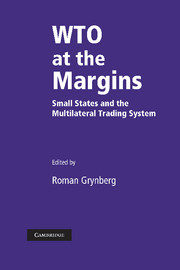Book contents
- Frontmatter
- Contents
- List of figures and appendices
- List of tables
- List of contributors
- Introduction
- Part I Theory and evidence
- 1 A theory of trade and development of small vulnerable states
- 2 Small countries: a survey of the literature
- 3 When comparative advantage doesn't matter: business costs in small economies
- 4 Can small states compete in manufacturing?
- 5 The economics of isolation and distance
- 6 The trade performance of small states
- 7 Small economies and special and differential treatment: strengthening the evidence, countering the fallacies
- Part II WTO and small economies
- Part III WTO dispute settlement
- Part IV Negotiating issues and institutional arrangements
- Index
7 - Small economies and special and differential treatment: strengthening the evidence, countering the fallacies
Published online by Cambridge University Press: 05 May 2010
- Frontmatter
- Contents
- List of figures and appendices
- List of tables
- List of contributors
- Introduction
- Part I Theory and evidence
- 1 A theory of trade and development of small vulnerable states
- 2 Small countries: a survey of the literature
- 3 When comparative advantage doesn't matter: business costs in small economies
- 4 Can small states compete in manufacturing?
- 5 The economics of isolation and distance
- 6 The trade performance of small states
- 7 Small economies and special and differential treatment: strengthening the evidence, countering the fallacies
- Part II WTO and small economies
- Part III WTO dispute settlement
- Part IV Negotiating issues and institutional arrangements
- Index
Summary
Introduction
Small economies present a particular challenge to the multilateral trade regime: will it adjust to arrest their increasing marginalisation in world trade that is undermining their development prospects significantly? This challenge poses the question of whether emerging international trade rules are damaging the trade and development interests of small economies and, if so, whether derogations from those rules can avert such damage. An answer that more favourable treatment offers small economies the potential for a beneficial means of insertion in world markets is incomplete, however, without considering the negotiating context from which trade rules emerge. Whether favourable treatment is likely to result from the interstate bargaining process determining the rules is the more problematic aspect of the challenge small economies pose for the multilateral trading system.
This chapter argues that the peculiar economic characteristics of small economies combine to constrain their potential to benefit from the globalisation of markets under currently agreed trade rules. Though supported by recent empirical evidence, these arguments are contentious and require engaging with contrary views refuting that small size undermines trade competitiveness, that vulnerability to external economic shocks and natural disasters has real economic costs, and that small economies' characteristics are peculiar and worthy of specific responses. The chapter goes on to argue that, as the implications of emerging trade rules are realised, the marginalisation of small economies will be exacerbated. Whilst modifying multilateral trade rules is not the only initiative required to address the specific trade and development needs of small economies, it is argued to be vital.
- Type
- Chapter
- Information
- WTO at the MarginsSmall States and the Multilateral Trading System, pp. 227 - 278Publisher: Cambridge University PressPrint publication year: 2006



